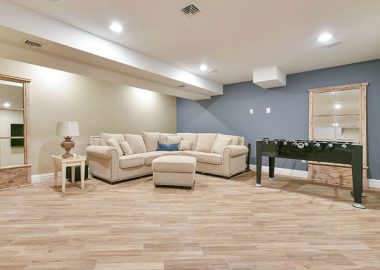Basements have become more than just storage spaces in recent times. People now use their basements for multiple purposes, from a home gym to a media room. And with this shift in purpose comes the need for proper flooring. Basement flooring needs to be durable, moisture-resistant, and comfortable. Here are the top five flooring options for your finished basement.
Ceramic Tile Flooring
Ceramic tiles are a popular choice for basement flooring due to their durability and resistance to moisture. They are also easy to clean, which makes them ideal for areas that experience high traffic. Ceramic tiles come in a variety of colors, patterns, and sizes, giving homeowners a range of options to choose from.
One of the biggest advantages of ceramic tiles is their ability to withstand flooding. The tiles do not absorb water and dry out quickly, making them ideal for damp areas. This is a common problem in basements, especially during heavy rainstorms.
Another advantage of ceramic tiles is their longevity. With proper installation and maintenance, ceramic tiles can last for years without showing any signs of wear and tear. They are also resistant to scratches, which makes them ideal for households with pets.
Luxury Vinyl Tile (LVT) Flooring
A luxury vinyl tile (LVT) is another popular basement flooring option. LVT is a synthetic flooring material that mimics the appearance of natural materials such as wood or stone. It is durable, waterproof, and comfortable underfoot.
LVT is a versatile flooring option used in various basement spaces, including family rooms, bedrooms, and home gyms. It is also slip-resistant, which makes it ideal for areas where spills are common.
One of the biggest advantages of LVT is its ability to mimic natural materials. LVT comes in various colors, patterns, and textures, giving homeowners a wide range of options. It is also more affordable than natural materials, which makes it an ideal choice for those on a budget.
Concrete Flooring
Concrete flooring is a durable and cost-effective flooring option for basements. It is resistant to moisture, which makes it ideal for areas that experience high humidity levels. Concrete flooring is also easy to clean and maintain.
One of the biggest advantages of concrete flooring is its versatility. Concrete flooring can be polished, stained, or painted for various looks. It can also be stamped or engraved to create unique designs.
Another advantage of concrete flooring is its durability. With proper installation and maintenance, concrete flooring can last for years without showing any wear and tear. It is also an eco-friendly option that can be recycled and reused.
Carpet Flooring
Carpet flooring is a popular basement choice due to its warmth and comfort underfoot. It is also a versatile flooring option used in various basement spaces. Carpet flooring comes in a variety of styles, textures, and colors, giving homeowners a range of options to choose from.
One of the biggest advantages of carpet flooring is its ability to absorb sound. This makes it ideal for basements used as media rooms or home theaters. Carpet flooring is also slip-resistant, which makes it ideal for households with young children.
Another advantage of carpet flooring is its affordability. Carpet flooring is one of the most affordable basement flooring options, making it an ideal choice for those on a budget.
Engineered Hardwood Flooring
Engineered hardwood flooring is a popular choice for basements due to its durability and resistance to moisture. It is also a versatile flooring option used in various basement spaces. Engineered hardwood flooring comes in various styles, textures, and colors, giving homeowners a range of options.
One of the biggest advantages of engineered hardwood flooring is its ability to mimic natural hardwood flooring. It is made from a thin layer of natural wood placed over a plywood or high-density fiberboard core. This gives it the appearance of natural hardwood flooring but with added durability and moisture resistance.
Another advantage of engineered hardwood flooring is its ease of installation. It can be installed as a floating floor, which means it can be installed without glue or nails. This makes it an ideal choice for DIY projects.
It is important to note that not all engineered hardwood flooring is suitable for basements. Choosing flooring with a moisture-resistant core and a durable top layer is important.
Conclusion
Choosing the right flooring option for your finished basement is crucial. The flooring needs to be durable, moisture-resistant, and comfortable underfoot. Ceramic tiles, luxury vinyl tiles, concrete flooring, carpet flooring, and engineered hardwood flooring are some of the best flooring options for your finished basement. Each option has its advantages and disadvantages, so it is important to choose the option that best suits your needs and budget. With the right flooring, your finished basement can transform into a comfortable and functional space you can enjoy for years.
Are you looking for basement flooring? Contact BTBT Home Renovators now!

